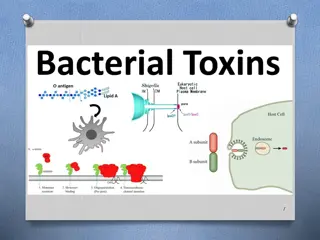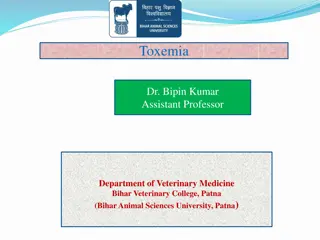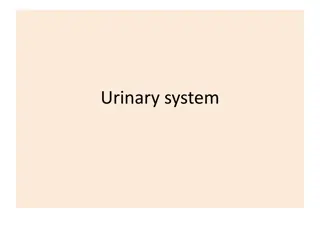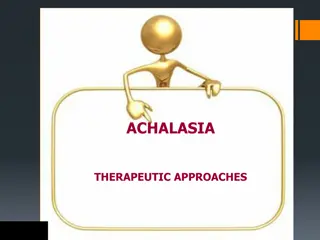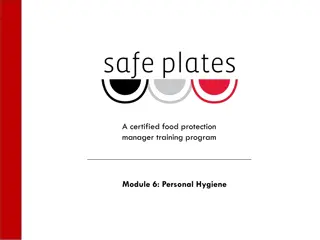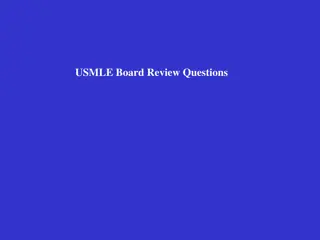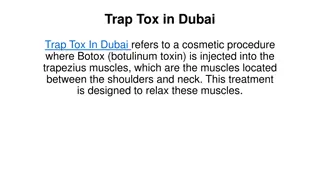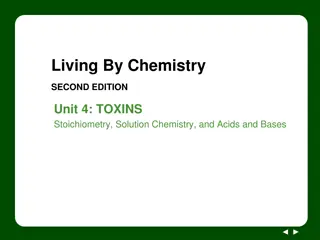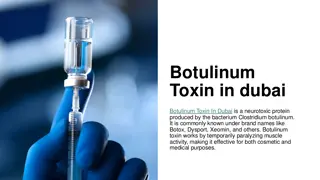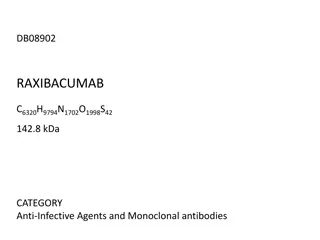Actions Emanating from the Evaluation of the Governance Reform
The evaluation of the governance reform within the WMO aimed to assess its alignment with strategic objectives, effectiveness in responding to societal needs, coordination efficiency, decision-making process, agility, and more. Evaluation criteria included relevance, design validity, effectiveness,
1 views • 13 slides
Biological Registration Process and Administrative Controls for Safety Focus
Registering work involving biological materials, toxins, and recombinant DNA is essential for safety compliance. Principal Investigators must follow NIH guidelines and register with the Institutional Biosafety Committee. Contact NIH for additional instructions on working with toxins and Select Agent
4 views • 13 slides
Understanding Bacterial Toxins and Cell Damage
Bacterial toxins are poisonous substances produced by microbes that can cause harm to host cells through direct damage, toxin production, and hypersensitivity reactions. Toxigenesis is a crucial mechanism used by bacterial pathogens to induce disease, with endotoxins and exotoxins playing distinct r
2 views • 28 slides
Gir Cow Ghee A Touch of Tradition with Goseva's Gir Cow and A2 Ghee
Crafted with the essence of Gir Cow Dung, these charcoal-free dhoop sticks offer a toxin-free aromatic experience, steering clear of the harmful fumes associated with traditional black dhoop battis. Infused with aromatic essential oils, the Goseva Kapur Dhoop Sticks provide a long-lasting, soothing
2 views • 5 slides
Comprehensive School Quality Assurance and Evaluation Process
A detailed insight into the Quality Assurance Department's role in school evaluation and improvement processes, including Whole School Evaluation (WSE), Follow-through initiatives, Teaching and Learning assessments, Resumption and Examination Monitoring. The process involves both internal self-evalu
0 views • 20 slides
Methods of Training Evaluation: Overview and Importance
Training and development are fast-growing fields globally, including in India. Evaluation plays a crucial role in understanding the effectiveness and efficiency of training programs for human resource development. This presentation covers the concept of training, evaluation strategies, methods/model
0 views • 61 slides
Universal Evaluation Framework: Simplifying Evaluation Processes
This session introduces the Universal Evaluation Framework (UEF) developed for evaluating QAA Scotland Enhancement Themes. Participants learn key evaluation questions, evidence capture, and the Theory of Change to enhance evaluation confidence. The QAA Scotland Evaluation Odyssey details historical
2 views • 14 slides
Implementing Blind Evaluation Pilot in HORIZON EUROPE: Key Facts and Process
HORIZON EUROPE is conducting a pilot on Blind Evaluation in the 2023-2024 work program to address biases in the research and innovation evaluation process. The pilot aims to assess the feasibility of blind evaluations in ensuring fairness and mitigating potential biases towards well-known organizati
9 views • 9 slides
Strengthening National Evaluation Capacity in the Era of Sustainable Development Goals
The presentation by Vijayalakshmi Vadivelu at the National Evaluation Capacities Conference 2017 in Istanbul focused on the importance of strengthening national evaluation capacity in alignment with the Sustainable Development Goals (SDGs). The content covers the holistic approach to national evalua
3 views • 18 slides
Exploring Developmental Evaluation for Better Decision-Making
Delve into the realm of developmental evaluation, focusing on its purpose, principles, and application in practice. Understand how developmental evaluation emphasizes real-time data collection for informed decision-making in complex systems. Learn about key principles such as developmental purpose,
0 views • 25 slides
Evaluation Practices in Macedonia: What Works, What Doesn't
The comparison between the effectiveness of evaluation practices and the presence of formal institutions in Macedonia raises questions about the impact of institutional design on outcomes. While some countries with robust evaluation institutions fall short in practice, others lacking such structures
1 views • 7 slides
Enhancing Evaluation Capabilities in Mongolia for Agenda 2030
The Mongolian Evaluation Network in collaboration with UNDP is working to integrate the 2030 Agenda into national strategies and plans, establish institutional coordination mechanisms, align budgets, and enhance data monitoring systems. Key stakeholders including government agencies, NGOs, and inter
0 views • 9 slides
Understanding Toxemia in Veterinary Medicine
Toxemia is a systemic condition triggered by toxins from bacteria or tissue injury, not plant or insect toxins. Endotoxemia, caused by LPS cell components of Gram-negative bacteria, leads to severe physiological abnormalities. Etiology involves various toxin types, including exotoxins and enterotoxi
1 views • 15 slides
Understanding Demi-Regularity in Realist Evaluation
Realist Evaluation is a theory-driven approach focusing on understanding the context and mechanisms of action behind policies and interventions. This webinar explores the concept of demi-regularity in realist evaluation, its origins, and its application in analyzing complex evidence. Key aspects cov
1 views • 16 slides
Understanding Evaluation in Education
Evaluation in education is a comprehensive term that encompasses measurement, testing, and qualitative examination of student behavior. It involves both quantitative and qualitative descriptions, along with value judgments. Differentiating from mere measurement, evaluation provides a deeper analysis
0 views • 28 slides
Understanding the Urinary System: Kidneys, Functions, and Structure
The urinary system, also known as the renal system, consists of the kidneys, ureters, bladder, and urethra. Each kidney contains nephrons, the functional units responsible for filtering waste and regulating blood volume, pressure, electrolytes, and pH balance. The kidneys have an extensive blood sup
0 views • 35 slides
Buy Botox 200U Online - dermafillerstore.com
Buy Botox 200U Online is a brand name for a toxin produced by the bacterium Clostridium botulinum. Although it's best known for its cosmetic use in reducing the appearance of wrinkles, Botox is also used for various medical conditions, such as chroni
1 views • 4 slides
Sustainable Evaluation Systems Workshop Summary
Workshop on Sustainable Evaluation Systems by Stephen Porter at the NEC Conference focused on defining evaluation systems, addressing their failures, and emphasizing the importance of quality, use, and networks in achieving sustainability. Participants engaged in activities such as bingo card introd
0 views • 38 slides
Strategic Management: Strategy Review and Evaluation
This chapter delves into the critical process of strategy review, evaluation, and control in strategic management. It covers the nature of strategy evaluation, effective evaluation systems, contingency planning, auditing, using computers for evaluation, and guidelines for effective strategic managem
1 views • 42 slides
Understanding Achalasia: Therapeutic Approaches, Pathophysiology, and Clinical Manifestations
Achalasia is characterized by a failure of the lower esophageal sphincter to relax, leading to difficulty in swallowing and regurgitation. The exact cause is unknown, but autoimmune factors and chronic infections may play a role. Symptoms include dysphagia, chest pain, regurgitation, and weight loss
0 views • 59 slides
Understanding Evaluation and Ideology in Translation
Evaluation plays a crucial role in the study of translation, influencing both meaning and value in communication. This evaluation is reflected through language elements like accentuation, deletion, and substitution. Appraisal, stance, and evaluation are key terms in linguistic analysis that focus on
2 views • 22 slides
Impact and Evaluation Toolkit for Churches and Christian Charities
This toolkit aims to equip churches and Christian charities engaged in small-scale social action projects to think about impact, measure impact, choose data tools, reflect on evaluation data, and use it effectively. It covers principles of evaluation, setting objectives, selecting indicators, storyt
0 views • 34 slides
Evaluation Metrics for IEEE 802.11-14/0107 HEW Proposal
Evaluation metrics play a crucial role in assessing WLAN system performance and achieving the objectives of High Efficiency WLAN (HEW). This proposal by Yonggang Fang et al. from ZTE outlines the key evaluation metrics recommended for evaluating HEW performance, including area throughput, average th
0 views • 12 slides
Overview of Monitoring and Evaluation in the GEF
The Evaluation in the GEF and Training Module focuses on promoting accountability and learning within the Global Environment Facility (GEF) through monitoring and evaluation activities. The GEF Independent Evaluation Office plays a crucial role in assessing results, effectiveness, and performance of
0 views • 25 slides
Managing Staphylococcus Risks in Food Preparation
Learn about a foodborne illness outbreak linked to Staphylococcus aureus, caused by improper food handling practices. Understand the symptoms, likely causes, and prevention strategies to minimize the risk of toxin formation. Explore best practices and key terms related to food safety.
0 views • 27 slides
Chile Country Portfolio Evaluation 2010-2014 Summary
Evaluation process of Chile's country portfolio from 2010-2014 included pre-evaluation, during evaluation, and results/conclusions phases. Challenges like defining scope and participant concerns were addressed. Preliminary conclusions were presented to stakeholders, leading to a trustful and represe
1 views • 6 slides
Potential Amendments for Reforming REACH Evaluation Process
Discussion at the Ad-hoc Meeting of Competent Authorities for REACH and CLP focused on potential options for amending the REACH Regulation to reform the evaluation process. Topics included registration-related measures, substance evaluation, testing proposals, compliance checks, and expectations dur
0 views • 30 slides
Understanding Microbiology Lab Results: Case Study of Mrs. Septic's Infection
In this case study, Mrs. Septic's blood cultures are growing gram-positive cocci, leading to a differential diagnosis involving various bacterial pathogens. Through a series of microbiology lab findings, the causative organism, Staphylococcus aureus, is identified. Further complications arise, indic
0 views • 73 slides
Developing an Evaluation Work Plan for Effective Program Assessment
This presentation by Amy D. Andrade from San Jose State University focuses on developing an Evaluation Work Plan to identify responsibilities and timelines. It covers topics such as Evaluation Coaching Support, Webinar Outlines, Logic Model, Inputs-Outputs-Outcomes, Two Approaches to Evaluation, Pro
0 views • 29 slides
Overview of Corynebacterium diphtheriae Pathogenesis and Virulence Factors
Corynebacterium diphtheriae is a non-spore forming Gram-positive bacillus responsible for causing diphtheria in humans. This bacterium, particularly C. diphtheriae, is known for producing a potent exotoxin called diphtheria toxin, which blocks protein synthesis and leads to serious complications suc
0 views • 25 slides
Understanding Bacterial Toxins: Production, Types, and Effects
Explore the world of bacterial toxins, focusing on production mechanisms, various types such as cytotoxins and their effects on host cells. Delve into specific examples like Diphtheria Toxin caused by Corynebacterium diphtheriae, understanding its biological features and the disease it leads to.
0 views • 13 slides
Evaluation Synthesis in Changing Contexts: Enhancing Knowledge for Development Effectiveness
Evaluation synthesis is crucial for promoting learning, reflection, and decision-making in development work. This process involves bringing together diverse knowledge sources to generate strategic insights and facilitate wider use of evaluation findings. The Independent Office of Evaluation of IFAD
0 views • 20 slides
Trap Tox in Dubai.pptx
Trap Tox refers to a cosmetic procedure where Botox (botulinum toxin) is injected into the trapezius muscles, which are the muscles located between the shoulders and neck. This treatment is designed to relax these muscles.
4 views • 5 slides
Evaluation of FME Zero Emission Neighbourhoods in Smart Cities
The mid-term evaluation process of FME Zero Emission Neighbourhoods in Smart Cities involves self-evaluation, partner evaluation, and panel evaluation. The procedure includes scientific review, evaluation by scholars, and innovation assessment. Key documents like self-reports, progress reports, and
1 views • 20 slides
Overview of Regular Evaluation 2017 Findings in Estonia
In the Regular Evaluation 2017, efforts were made to maximize the benefits of evaluation outcomes for various stakeholders in Estonia such as the state, society, and institutions. The evaluation focused on a range of actions including preparing legislation, finding experts, creating self-report form
0 views • 6 slides
Understanding Toxicity Through Stoichiometry and Molar Mass
Delve into the world of toxicity analysis by comparing the amounts of different substances using moles and molar mass. Explore the safety of sweeteners and learn how to utilize these concepts to assess toxicity levels. Engage in thought-provoking discussions and activities to deepen your understandi
0 views • 10 slides
Comprehensive Guide to Training Evaluation Methods
This detailed guide covers the aim of evaluation, evaluation methods, techniques of evaluation, types of evaluation (formative, process, outcome, impact), and the significance of formative and process evaluation in assessing training effectiveness. Learn about the key principles and practices involv
0 views • 45 slides
Botulinum Toxin in dubai
Botulinum toxin is a neurotoxic protein produced by the bacterium Clostridium botulinum. It is commonly known under brand names like Botox, Dysport, Xeomin, and others. Botulinum toxin works by temporarily paralyzing muscle activity, making it effect
0 views • 5 slides
Raxibacumab: Monoclonal Antibody for Inhalational Anthrax
Raxibacumab is a human IgG1 monoclonal antibody designed to treat and prevent inhalational anthrax caused by Bacillus anthracis. It targets the protective antigen component of the anthrax toxin, inhibiting its binding to cellular receptors and preventing toxin entry. Administered via IV infusion, Ra
0 views • 6 slides
Managing Solid Waste: Importance, Risks, and Solutions
Solid waste management is crucial to address environmental hazards such as disease spread, respiratory issues, and toxin release. By reducing and managing solid waste effectively, we can improve public health and prevent pollution of soil and water bodies. The presentation highlights reasons to mini
0 views • 64 slides


